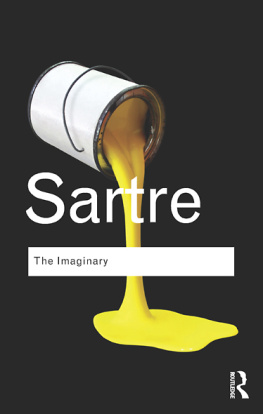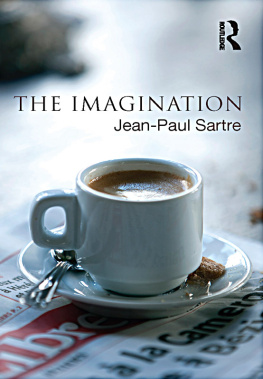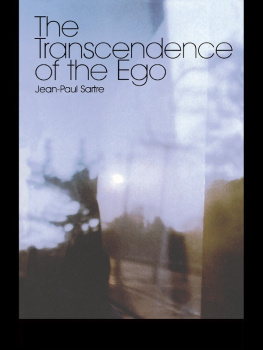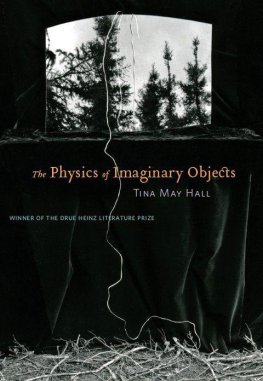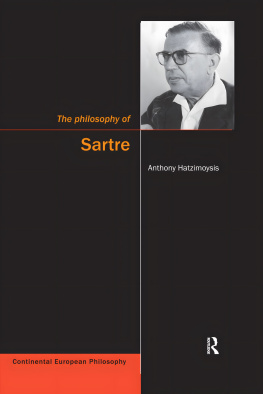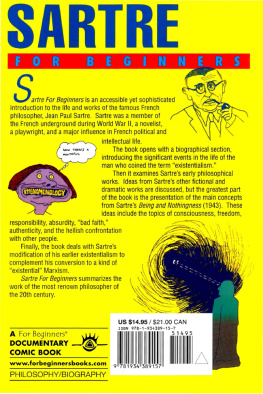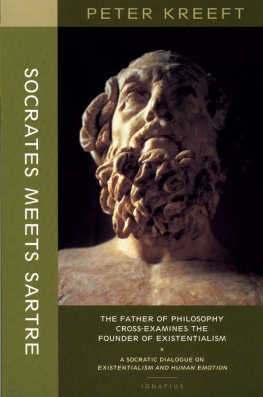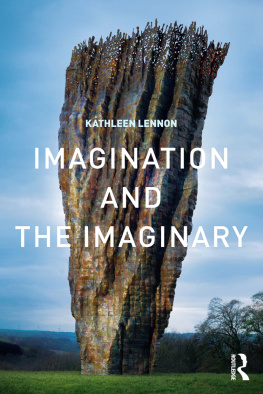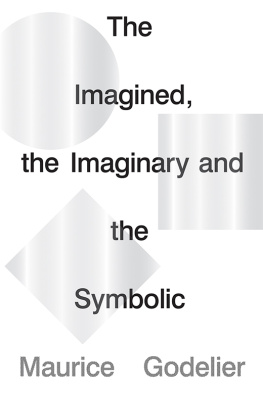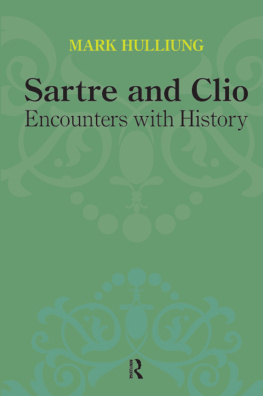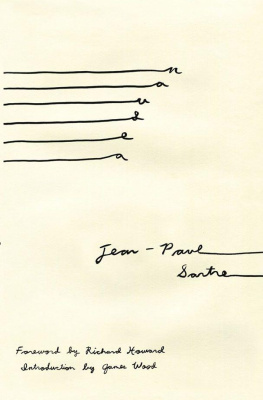Sartre - The Imaginary
Here you can read online Sartre - The Imaginary full text of the book (entire story) in english for free. Download pdf and epub, get meaning, cover and reviews about this ebook. year: 2010, publisher: Taylor & Francis, genre: Science. Description of the work, (preface) as well as reviews are available. Best literature library LitArk.com created for fans of good reading and offers a wide selection of genres:
Romance novel
Science fiction
Adventure
Detective
Science
History
Home and family
Prose
Art
Politics
Computer
Non-fiction
Religion
Business
Children
Humor
Choose a favorite category and find really read worthwhile books. Enjoy immersion in the world of imagination, feel the emotions of the characters or learn something new for yourself, make an fascinating discovery.
The Imaginary: summary, description and annotation
We offer to read an annotation, description, summary or preface (depends on what the author of the book "The Imaginary" wrote himself). If you haven't found the necessary information about the book — write in the comments, we will try to find it.
The Imaginary — read online for free the complete book (whole text) full work
Below is the text of the book, divided by pages. System saving the place of the last page read, allows you to conveniently read the book "The Imaginary" online for free, without having to search again every time where you left off. Put a bookmark, and you can go to the page where you finished reading at any time.
Font size:
Interval:
Bookmark:
The Imaginary
We may therefore conclude that imagination is not an empirical power added to consciousness, but it is the whole of consciousness as it realizes freedom.
Jean-Paul Sartre

Routledge Classics contains the very best of Routledge publishing over the past century or so, books that have, by popular consent, become established as classics in their field. Drawing on a fantastic heritage of innovative writing published by Routledge and its associated imprints, this series makes available in attractive, affordable form some of the most important works of modern times.
For a complete list of titles visit
www.routledge.com/classics
The Imaginary
A phenomenological psychology of the imagination
Jean-Paul Sartre
With introductions by Arlette Eelkam-Sartre and Jonathan Webber

London and New York
To Albert Morel
First published in 1940 in French as Limaginaire
by ditions Gallimard, Paris
This translation first published 2004 by Routledge
First published in the Routledge Classics 2010
by Routledge
2 Park Square, Milton Park, Abingdon, Oxon, OX14 4RN
Simultaneously published in the USA and Canada
by Routledge
270 Madison Avenue, New York, NY 10016
Routledge is an imprint of the Taylor & Francis Group, an informa business
This edition published in the Taylor & Francis e-Library, 2010.
To purchase your own copy of this or any of Taylor & Francis or Routledges collection of thousands of eBooks please go to www.eBookstore.tandf.co.uk.
1940, 1986 ditions Gallimard
Translation 2004, 2010 Routledge
Historical Introduction 2004 Arlette Eelkam-Sartre
Philosophical Introduction 2004 Jonathan Webber
All rights reserved. No part of this book may be reprinted
or reproduced or utilised in any form or by any electronic,
mechanical, or other means, now known or hereafter
invented, including photocopying and recording, or in
any information storage or retrieval system, without
permission in writing from the publishers.
British Library Cataloguing in Publication Data
A catalogue record for this book is available from the British Library
Library of Congress Cataloging in Publication Data
A catalog record for this book has been requested
ISBN 0-203-85706-2 Master e-book ISBN
ISBN 10: 041556784-X (pbk)
ISBN 10: 0203857062 (ebk)
ISBN 13: 9780415567848 (pbk)
ISBN 13: 9780203857069 (ebk)
by Arlette Elkam-Sartre
Sartre was a young schoolteacher in Le Havre in 1934 when he undertook to write a work on imagination., hardly depart from the aims of psychology thus defined at least formally except in the conclusions of this latter writing.
But as we will soon see, facts, as Sartre understands them here, and consequently laws, will not have the same meaning as in the official handbook of psychology.
Right from the start, The Imaginary manifests Sartres resolution to turn his back on the theories that he was taught and in turn had to inculcate in his pupils. He knew by heart the arguments for these theories based on certain facts and the objections to these arguments based on other facts, themselves more or less challenged by rival theories: Condillacs sensualism, according to which all the human faculties can be produced by assembling elementary sensations; the associationist theories, due to Hume, Mill, Taine, etc., and all the nuances that distinguish them in their ways of conceiving the relation between sensory impressions and states of consciousness as well as in their
It must be that each man has been born to make, in order to understand the world, a new and solitary effort, the young Sartre wrote candidly in a notebook. He retained the ambition to construct a new and concrete philosophy and it is with the concrete that he intends to begin here. This does not mean that in his exploration of the imaginary life, he will give primacy to matter, and even less so to the matter that science studies. He is convinced, for example, that cerebral localisations, however precise and complex the progress of technical instruments permits us to determine them, can explain nothing other than the conditions necessary for the existence of the psychic functions; they can never provide an account of the fact that I am a consciousness that perceives, remembers, imagines, and projects itself into the future.
It is worth remembering that another philosopher had, forty years earlier, opened a study of the psychic life by invoking concrete experience and intuition. It was Henri Bergson (18591914), whose Time and Free Will: An Essay on the Immediate Data of Consciousness had originally given Sartre the taste for philosophy. Although he had first published his outstanding books, such as Matter and Memory, at the end of the nineteenth century, the originality of his philosophy was still fully felt in France in the thirties, as much among psychologists as among metaphysicians. The 1935 edition of Cuvilliers manual clearly counts his ideas as standing out strongly from previous theories, but with many reservations. Sartre cited it approvingly in his Ecrits de Jeunesse. Its relevance here is that the author of Nausea often has it in mind when writing The Imaginary, either to refute it, or to draw on one of its ideas, such as duration in psychic life. It is impossible to give even a vague idea of the whole of Bergsons philosophy, in which psychology and metaphysics are interlinked, within the scope of this introduction: I want only to outline the intellectual framework within which Sartre wrote this work. I am content to point out that the author of Matter and Memory intended to refute associationism; like Sartre, he held that the mental image is not a weakened perception, a more or less automatic revival, but that it differs from perception in its very nature and, more generally, that the metaphysical question of human freedom and that of the being of consciousness are closely linked. In The Imagination, Sartre provided a detailed analysis of the contradictions that he saw in the position of the vitalist philosopher for whom the evolution of life, from its origins to man, evokes the image of a current of consciousness inserted in matter like an underground passage.
But the concrete that concerns Sartre is far from Bergsonian intuition, which he considers too subjective. Besides, it will lead the philosopher to argue less and less, to cosmic reverie which is foreign to Sartres concerns. By concrete, he understands the points of support that make it possible for the data of experience to have sense. The most indubitable concrete is for him the cogito of Descartes. I think, therefore I am is the affirmation that reflective consciousness is possible, and is a solid springboard for researching other truths: for Descartes, if I can be mistaken about the existence of the world so long as I have not proven that there is a God who guarantees its existence, I can at least be certain that I exist, since I think. It is the same for Sartre: someone who, in an act of reflection, becomes conscious of having an image cannot be mistaken. One should therefore initially explore all that reflective consciousness can reveal about the specific characteristics of the image, about what occurs for me when I have an image.
Font size:
Interval:
Bookmark:
Similar books «The Imaginary»
Look at similar books to The Imaginary. We have selected literature similar in name and meaning in the hope of providing readers with more options to find new, interesting, not yet read works.
Discussion, reviews of the book The Imaginary and just readers' own opinions. Leave your comments, write what you think about the work, its meaning or the main characters. Specify what exactly you liked and what you didn't like, and why you think so.

